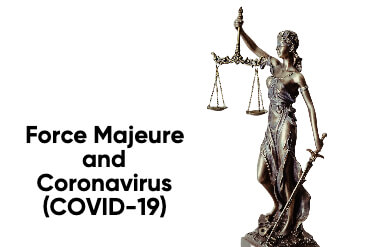Force majeure is usually defined as an unforeseen incident, or an event that can neither be anticipated or controlled, such as an act of God, war etc., making it impossible for a party facing force majeure to perform his obligations under the contract. Hence, a Force majeure clause is included in most of the contracts, to provide some relief to the party facing difficulty to perform the contractual obligations.
WIDER MEANING OF THE TERM FORCE MAJEURE
The doctrine of Force Majeure has its root in Section 56 of the Contract Act, 1872 states that an agreement to do an act impossible in itself is void and if a contract has been entered into for a specific act and the act becomes impossible, by reason of some event which the party could not prevent, or the act becomes unlawful later, then the contract becomes void.
A force majeure provision in a commercial arrangement is an express provision of circumstances in which the performance under the contract will be excused or suspended temporarily. It is settled that where reference is made to ‘force majeure’, the intention is to save the performing party from the consequences of anything over which he has no control[1].
Under Indian law, the Force Majeure doesn’t simply mean anything outside the control of the parties to a contract. It’s meaning and applicability depends on the particular contract, and the particular wording used.[2] Force Majeure clauses in most of the contracts vary, and hence it is important to review these clauses. Some clauses list out specific examples of force majeure events, while others are in generic language.
Though the term ‘Force majeure is of wider import, the parties can take shelter under the Force majeure clause, only if they place the material/evidence to substantiate their plea or contention[3].
TO INVOKE THE FORCE MAJEURE CLAUSE
In order to invoke the force majeure clause, the party need to issue a written notice to the other party, as specified in the force majeure clause, notifying the suspension of the party’s obligations.
DOCTRINE OF FRUSTATION
This doctrine too has its root in Section 56 of the Contract Act. This doctrine is based on the impossibility of performance of the contract. The word "impossible" has not been used here in the sense of physical or literal impossibility. The performance of an act may not be literally impossible but it may be impracticable from the point of view of the object and purpose which the parties had in view; and if an untoward event or change of circumstances totally upsets the very foundation upon which the parties rested their bargain, it can very well be said that the promisor finds it impossible to do the act which he promised to do. This doctrine is usually relied upon for the termination of the contract unlike the concept of the Force Majeure, which is for the suspension of the obligation. It is settled that when there is frustration of contract, the dissolution occurs automatically.[4]
But when a contract contains a force majeure clause which on construction by the Court is held attracted to the facts of the case, the doctrine of frustration of Section 56 can have no application.[5]
COVID & FORCE MAJEURE
The outbreak of COVID -19 has been declared as a ‘Pandemic’ by the World Health Organisation.
There has been a negative impact on the world economy. The pandemic has affected a variety of contracts from construction contracts to manufacturing and supply-chain contracts.
In view of the lockdown and suspension orders by various governments vide specific ordinances and central government orders, it is fair to state that the COVID falls under Force Majeure. The parties to the commercial contracts need to assess their contractual provisions for seeking suitable rights and obligations to discharge the performance of the contract.
Guidelines for Renewable Energy Sectors:
• Time shall be granted based on evidences/documents produced by developers in
support of their respective claims of such disruption of the supply chains due
to spread of coronavirus.
• Further, all developers, claiming and desirous of time extensions, shall make
a formal application giving all documentary evidences in support of their
claim.
• Implementing agencies shall examine the claim objectively and grant
appropriate extensions, based on facts.
• Agency may fully satisfy itself that claimants were actually affected due to
disruption of the supply chains due to spread of coronavirus in the period for
which extension has been claimed.
• Implementing agencies shall also ensure that no double relief is granted due
to overlapping periods of time extension granted
CONCLUSION
The Government has not yet issued any memorandum granting relief to other commercial sector contracts. Hence, to evaluate whether a party can be excused from such a contract on account of Covid - 19, is to be determined on the facts and the nature of the party’s obligation and terms of the contract.
[1] Dhanrajamal Gobindram Vs Shamji Kalidas and Co. [AIR 1961 SC 1285], Pollock
and Mulla, Indian Contract and Specific Relief Acts.
[2] Chitty on Contracts, Vol. I (31st Edition)
[3] Amit Nag & Ors. Vs. Ramprastha Promoters & Developers Pcvt. Ltd. & Ors. [ I
(2020) CPJ 31 (NC)]
[4] Satyabraya Ghosh Vs. Mugneeram Bangur & Co. [1954 SCR 310(12)]
[5] Energy Watchdog and Ors.Vs. Central Electricity Regulatory Commission and
Ors. [2017 (6) SCJ 398]



Leave a Comment